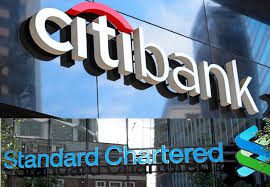Three major banks, Standard Chartered, Stanbic IBTC, and Citibank, were responsible for 80 per cent of Nigeria’s total capital inflows in the first quarter of 2025, reaffirming their central role in channeling foreign investment into the country’s financial system.
According to the latest figures released by the National Bureau of Statistics (NBS), Nigeria recorded a significant rise in capital importation, reaching $5.64 billion in Q1 2025.
This marks a 67.12 per cent jump compared to the $3.38 billion recorded during the same period in 2024, pointing to a renewed sense of investor confidence and an uptick in external financial engagement.
The banking sector attracted the highest level of inflows, pulling in $3.13 billion, which accounts for 55.44 per cent of the total capital imported in the period under review. Following closely was the financing sector with $2.1 billion, representing 37.18 per cent, while the production and manufacturing sector received $129.92 million, equivalent to 2.30 per cent of the total.
“The Banking sector recorded the highest inflow with US$3,127.92 million, representing 55.44% of total capital imported in Q1 2025,” the NBS noted in its report, reflecting the dominant influence of financial institutions in attracting foreign interest.
Standard Chartered Bank led all reporting institutions, facilitating $2.103 billion in capital inflows, a steep rise from $1.17 billion in the final quarter of 2024. Stanbic IBTC followed with $1.398 billion, slightly lower than the $2.236 billion it posted in Q4 2024. Citibank also recorded an increase, attracting $1.052 billion compared to $603.8 million in the previous quarter.
Combined, the three banks facilitated a total of $4.553 billion in capital inflows, cementing their status as the primary gateways for foreign investors seeking exposure to Nigerian markets.
The report identified the United Kingdom as the largest source of foreign capital, contributing $3.68 billion, which accounts for 65.26 per cent of total inflows. South Africa followed with $501.29 million, or 8.88 per cent, while Mauritius contributed $394.51 million, representing 6.99 per cent. These figures reinforce the country’s strong ties with established global financial centres and indicate a continued reliance on traditional investment partners.
Capital importation also showed quarter-on-quarter growth, rising 10.86 per cent from the $5.09 billion recorded in Q4 2024. The consistent upward trend suggests sustained momentum in Nigeria’s foreign investment landscape, particularly in light of ongoing reforms and policy signals aimed at improving the ease of doing business.
The data offers encouraging signals for Nigeria’s financial services industry and broader economy, especially as authorities intensify efforts to attract long-term capital, foster job creation, and meet national development goals.






